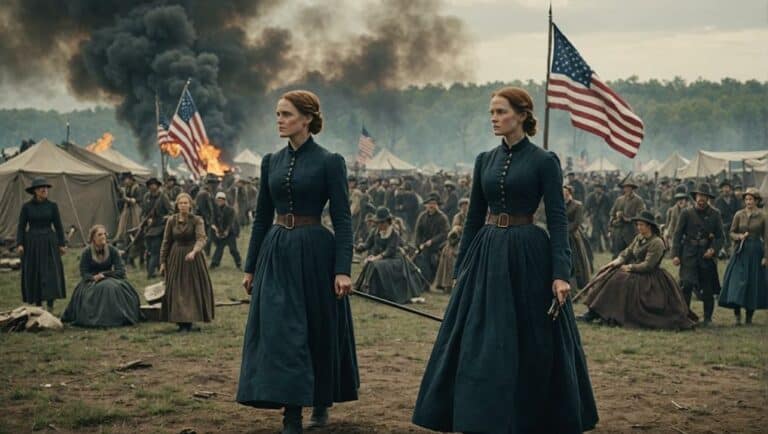Discover the untold stories of the Civil War's hidden heroes—women who broke barriers as nurses, spies, and soldiers.
From Clara Barton's pioneering work in modern nursing to Harriet Tubman's daring espionage, their extraordinary contributions shaped history and demand to be explored.
Pioneering Nurses
Pioneering nurses like Clara Barton and Louisa May Alcott played a critical role in providing medical care to wounded soldiers during the Civil War. These women faced challenging hurdles, including severe shortages of medical supplies and overwhelming patient numbers. Despite these obstacles, their dedication and compassion were unwavering.
Clara Barton, for instance, not only tended to the injured on the battlefield but also established supply lines to make sure that hospitals had the necessary resources. Louisa May Alcott contributed significantly by writing about her experiences, which drew attention to the dire conditions and the importance of effective medical care.
The pioneering efforts of these nurses didn't just save countless lives; they also laid the groundwork for the future of nursing. Barton's post-war establishment of the American Red Cross marked a notable advancement in humanitarian work and emphasized the critical role women could play in healthcare.
The experiences of women like Barton and Alcott during the Civil War showcased their resilience and underscored the need for organized, compassionate medical care. Their contributions were pivotal in shaping modern nursing practices and highlighted the essential role of women in the medical field.
Courageous Spies
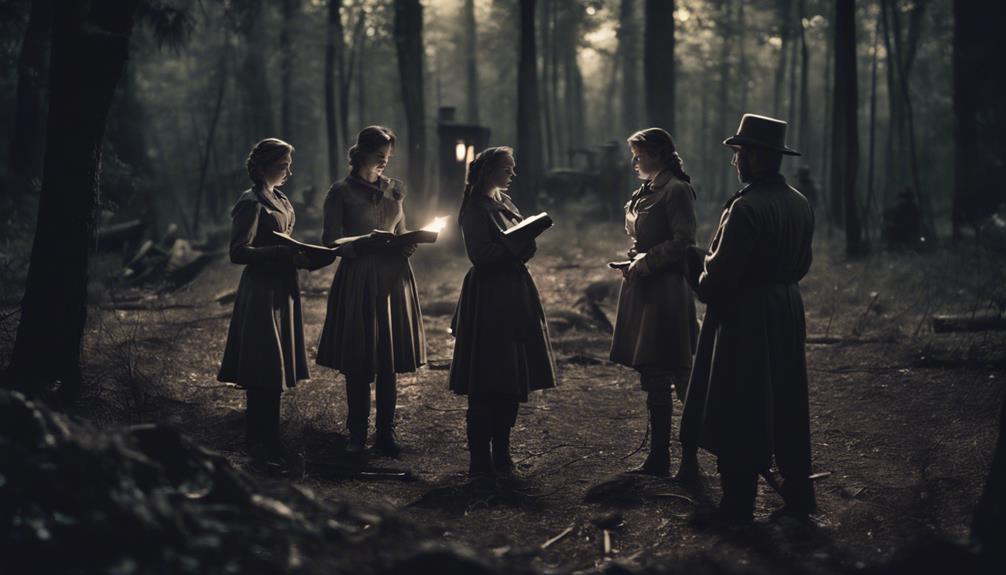
While the pioneering nurses demonstrated immense compassion on the battlefield, another group of brave women, such as Harriet Tubman and Belle Boyd, risked their lives as spies to gather essential intelligence during the Civil War. These women, operating in the shadows, played a pivotal role in shaping military strategies and outcomes.
Harriet Tubman, already famed for her work with the Underground Railroad, utilized her network and skills to serve as a spy for the Union. Her deep knowledge of Southern terrain and clandestine operations allowed her to gather crucial intelligence on enemy movements, greatly aiding Union forces. Tubman's espionage efforts were instrumental in several Union victories, showcasing her strategic acumen and unwavering courage.
On the Confederate side, Belle Boyd leveraged her charm and social connections to extract important information from Union officers. Boyd's intelligence-gathering efforts involved high-stakes deception and quick thinking, providing the Confederacy with valuable insights into Union strategies. Her daring actions and ability to operate undetected made her a formidable asset to the Southern cause.
These women, facing significant risks and challenges, demonstrated exceptional bravery and resourcefulness. Their contributions as spies were vital, often tipping the scales in favor of their respective sides during the Civil War.
Women Soldiers
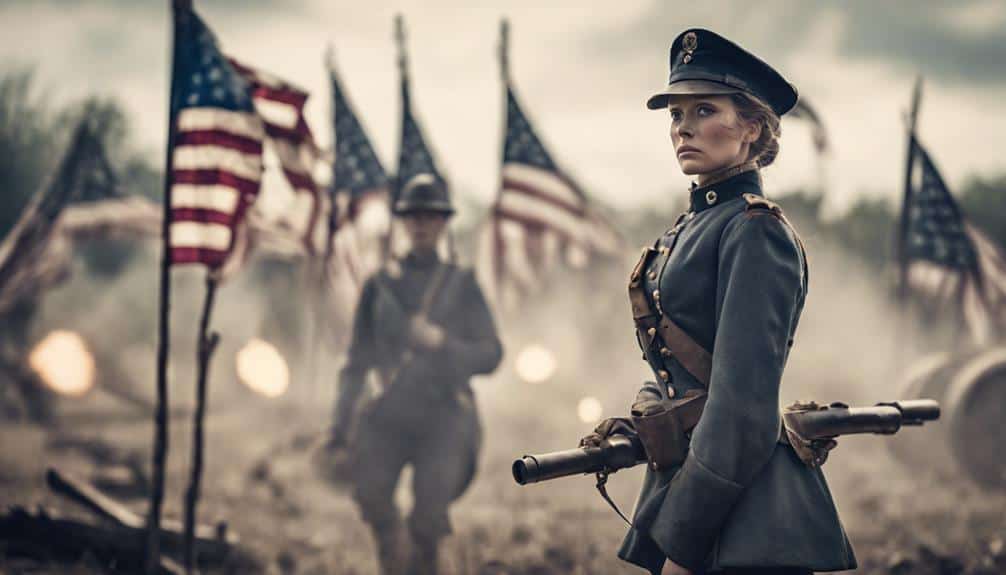
Disguising themselves as men, women like Sarah Emma Edmonds and Frances Clayton took extraordinary measures to actively participate as soldiers in the Civil War. It's estimated that between 400 to 1,000 women soldiers served during the conflict. These women faced significant challenges, including the need for secrecy and limited military training. Many enlisted to stay close to their husbands on the battlefield, adding a personal dimension to their already courageous acts.
Women soldiers had to continuously conceal their identities, often adopting male names and mannerisms. The lack of proper military training posed a significant hurdle, forcing them to learn on the fly while under the same brutal conditions as their male counterparts. Despite these challenges, they demonstrated remarkable resilience and resourcefulness.
Clara Barton, a pioneering nurse, brought attention to these hidden heroes. She discovered women like Mary Galloway, who'd served disguised as men, thereby highlighting the critical yet unrecognized roles women played in the war. The presence of women soldiers in the Civil War underscores the lengths to which they'd go to contribute to the war effort, challenging societal norms and risking their lives in the process.
Clara Barton
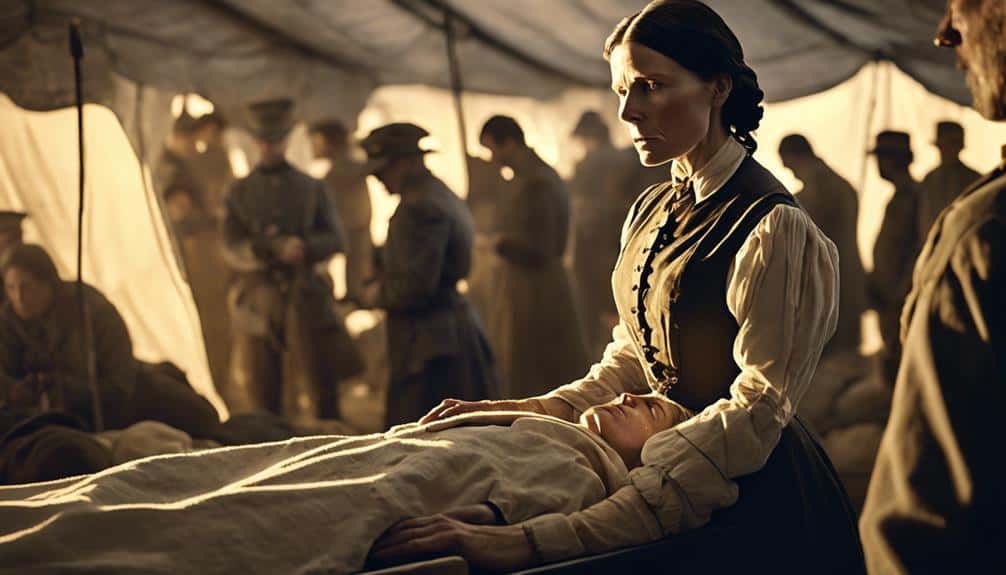
Clara Barton, known for her unwavering dedication during the Civil War, founded the American Red Cross to provide essential medical care and disaster relief. As a pioneering nurse, Barton didn't hesitate to bring aid directly to the front lines, where many others feared to tread. Her tireless work earned her the nickname 'Angel of the Battlefield,' and she became a symbol of hope for countless soldiers.
Barton's impact can be summarized through four key contributions:
- Frontline Nursing: She delivered critical medical care during battles, often risking her own life.
- Innovative Care: Barton introduced new methods for organizing and distributing medical supplies, ensuring that aid reached those who needed it most.
- Humanitarian Leadership: Beyond the Civil War, she extended her reach by founding the American Red Cross, which provided disaster relief and emergency assistance.
- Enduring Legacy: The organization she established continues to operate globally, reflecting her lifelong commitment to humanitarian efforts.
Through these actions, Clara Barton exemplified the spirit of selfless service. Her legacy lives on, not only in the history books but also in the ongoing work of the American Red Cross, a sign of her enduring impact.
Harriet Tubman
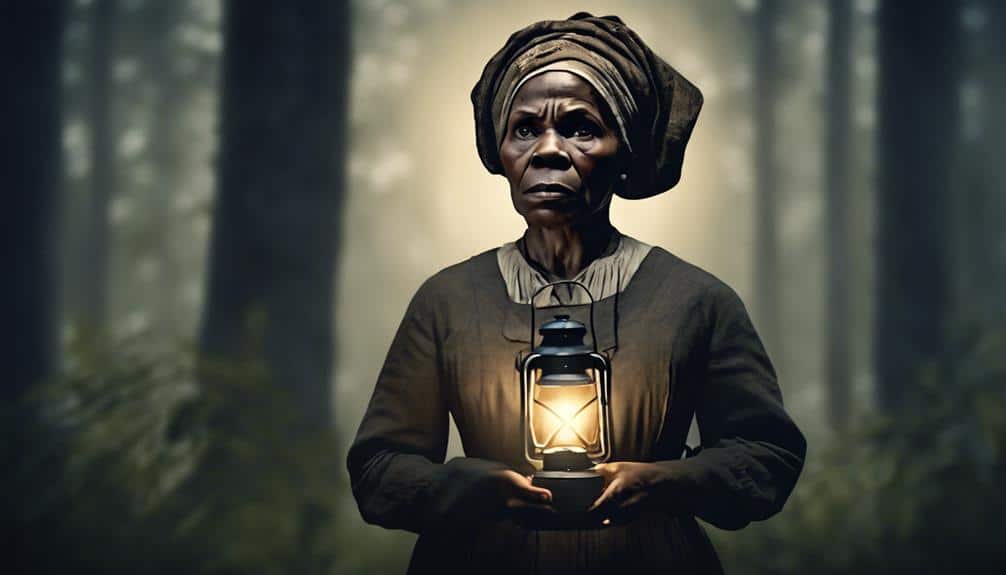
Harriet Tubman, often hailed as the 'Moses of her people,' played a pivotal role in both the abolitionist movement and the Civil War by leading numerous slaves to freedom and serving as a spy for the Union. As an abolitionist and conductor of the Underground Railroad, Tubman risked her life repeatedly to guide slaves to safety in the North. Her efforts weren't just about physical escape; she instilled hope and resilience among those she led.
During the Civil War, Tubman's role evolved as she became a Civil War spy for the Union. She provided critical intelligence, which included information on Confederate troop movements and supply lines. Her contributions were instrumental in several Union victories and highlighted her strategic acumen.
Tubman's legacy didn't end with the war. She continued her advocacy by fighting for civil rights and women's suffrage, demonstrating her unwavering commitment to equality. Her dedication helped over 700 slaves find freedom, solidifying her place as a key figure in American history.
Through her life's work, Harriet Tubman exemplified courage, resilience, and a relentless pursuit of justice, making her an enduring symbol of freedom and equality.
Louisa May Alcott
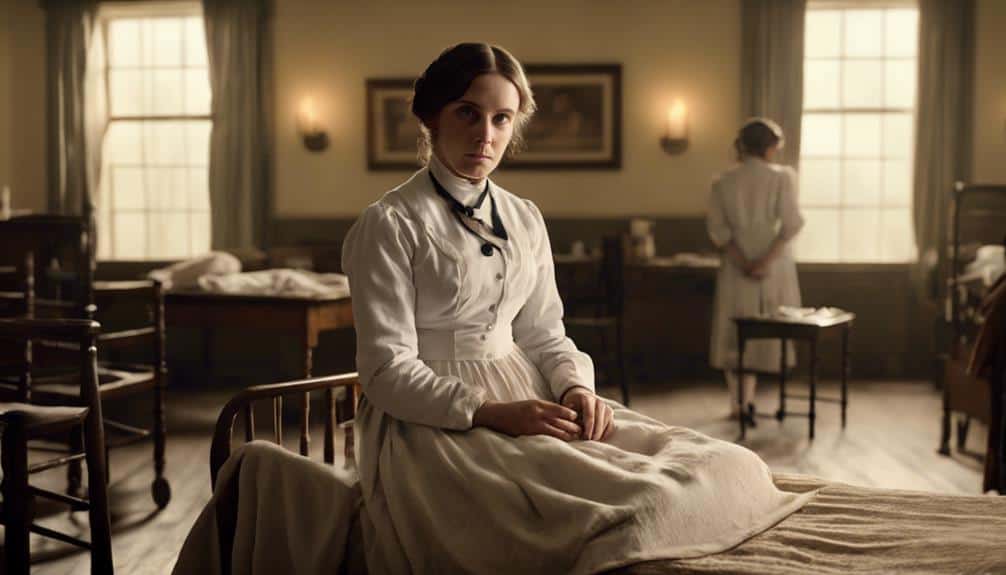
You might know Louisa May Alcott as the author of 'Little Women,' but her service as a nurse in a Union hospital during the Civil War is equally remarkable.
Despite contracting typhoid fever, Alcott's firsthand experiences caring for wounded soldiers demonstrated her resilience and compassion.
These experiences not only showcased the critical role of women in medical care but also inspired her to write 'Hospital Sketches,' offering a detailed account of wartime nursing.
Nursing During Civil War
Louisa May Alcott's tenure as a nurse at a Union hospital in Georgetown, Washington, D.C., highlights the crucial role women played in providing medical care during the Civil War. As a nurse, Alcott was deeply involved in the frontline efforts to tend to wounded soldiers, showcasing the invaluable contributions of women in medical aid during the conflict. Her work not only provided immediate care but also demonstrated the broader impact women had on military healthcare.
Analyzing Alcott's role, you can identify several key aspects of her contributions:
- Medical Aid: Alcott's hands-on approach in treating injuries and diseases illustrated the essential role of women in wartime medical care.
- Frontline Experience: By working directly on the frontline, she bore witness to the harsh realities of war, providing insights into the conditions faced by soldiers.
- Emotional Support: Beyond physical care, Alcott offered emotional and psychological support to the wounded, a crucial but often overlooked aspect of nursing.
- Documentation: Her detailed accounts of her experiences served to highlight the often underappreciated role of women in war, bringing their efforts to the forefront.
Author Turned War Nurse
Building on her firsthand experience in wartime nursing, Alcott leveraged her literary talents to document the grim realities she encountered, crafting a vivid portrayal of her service in 'Hospital Sketches.' Louisa May Alcott, best known as the author of 'Little Women,' served as a war nurse in a Union hospital in Georgetown, Washington, D.C., during the Civil War. Her dedication to her duty exposed her to the brutal conditions and relentless suffering of soldiers, which left an indelible mark on her.
Alcott's tenure as a nurse wasn't without personal cost. She contracted typhoid fever, a common and often deadly illness in wartime medical care settings, forcing her to leave her post prematurely. Despite this setback, Alcott turned her harrowing experiences into a powerful narrative.
'Hospital Sketches' provides an unvarnished look at the daily struggles and emotional toll faced by those in military hospitals.
Mary Edwards Walker
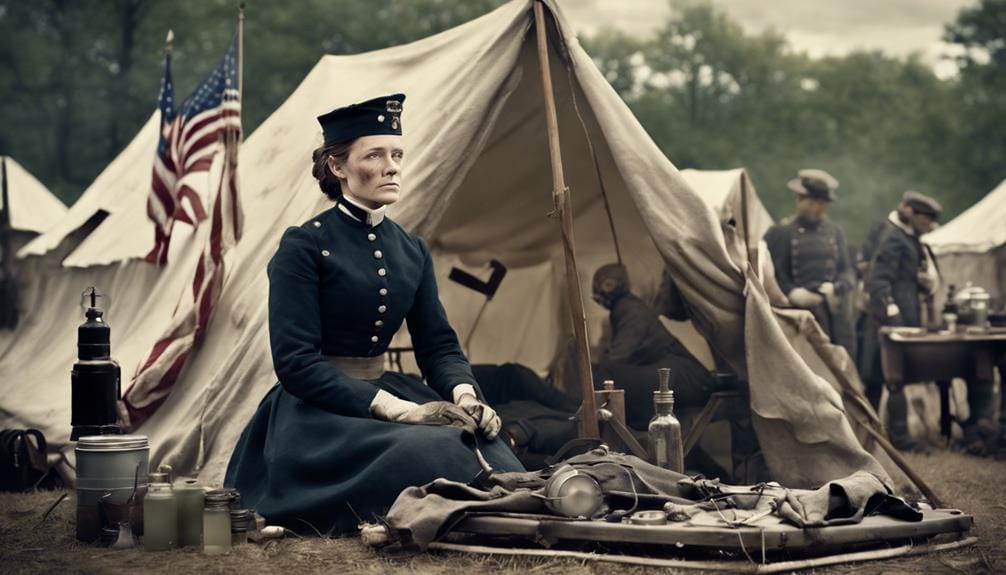
As a trailblazing surgeon during the Civil War, Mary Edwards Walker broke barriers by becoming the first woman to receive the Medal of Honor. Serving with the Union Army, Walker volunteered her medical expertise on the front lines, where she treated countless wounded soldiers. Her dedication in such perilous conditions didn't go unnoticed, but it wasn't without challenges. Walker faced significant discrimination, particularly for her choice to wear men's clothing, which she found more practical for her demanding work.
Walker's contributions can be appreciated through several key aspects:
- Medical Expertise: As a surgeon, she provided critical care under extreme conditions, showcasing exceptional skill and resilience.
- Pioneering Role: By stepping into a mainly male role, she paved the way for future generations of women in both the medical field and the military.
- Recognition: Despite societal norms, her bravery earned her the Medal of Honor, marking a significant achievement for women in history.
- Resilience Against Discrimination: Walker's perseverance in the face of prejudice highlights her commitment to her duty and to gender equality.
Understanding Mary Edwards Walker's contributions offers a deeper respect for her legacy and the barriers she dismantled.
Unsung Heroes
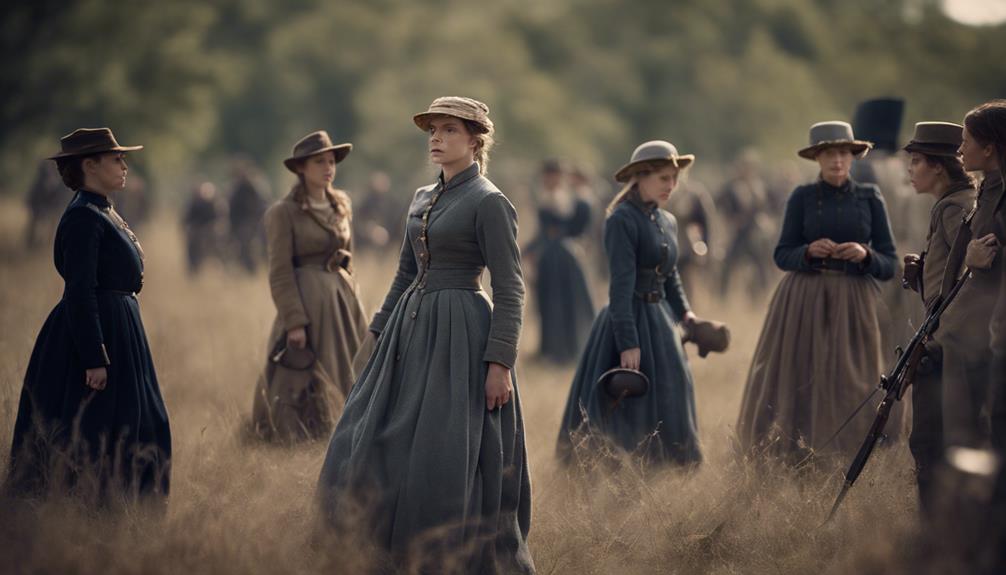
Amid the chaos of the Civil War, countless women emerged as unsung heroes, taking on diverse roles such as soldiers, nurses, spies, and couriers, all while defying societal expectations and contributing greatly to the war effort. These brave women, often hidden from historical recognition, played essential roles in various capacities.
Female soldiers like Sarah Emma Edmonds and Frances Clayton disguised themselves as men to fight on the battlefield, demonstrating immense courage and resilience. Their contributions weren't limited to combat; women also served as nurses, providing essential medical care, and as spies and couriers, gathering and delivering critical intelligence.
The presence of female soldiers, revealed posthumously in cases like Mary Galloway and Sarah Rosetta Wakeman, underscores the significant yet often overlooked impact of women during the Civil War. These hidden heroes challenged traditional gender roles, setting a precedent for future advancements in gender equality.
The bravery and contributions of these unsung heroes have gradually gained recognition, yet their stories remain a testament to the crucial, often unacknowledged, roles women have played in shaping history. By understanding these contributions, you gain a deeper appreciation for the multifaceted impact women had on the Civil War.
Overcoming Challenges
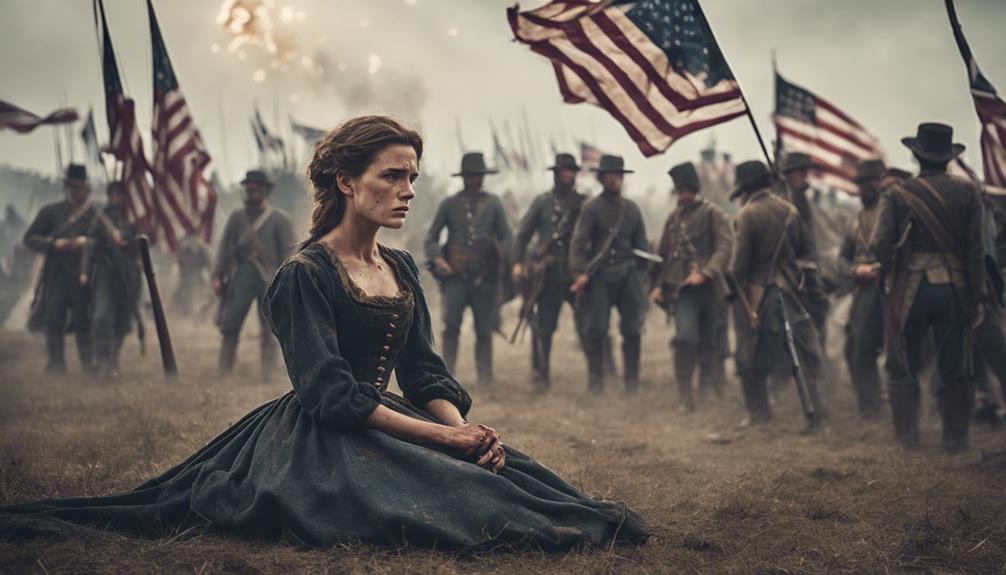
Despite their significant contributions, the brave women of the Civil War faced numerous challenges. They had to conceal their identities and adapt to the rigors of military life with limited training. Women soldiers navigated the complexities of secrecy by disguising themselves in men's clothing and adopting male mannerisms to avoid detection. This subterfuge was essential to prevent their immediate expulsion from the ranks.
The challenges were multifaceted:
- Military Training: Women soldiers received the same limited training as their male counterparts. However, they had to quickly adapt without the same societal preparation for combat roles.
- Secrecy: To maintain their cover, female soldiers avoided public latrines and medical examinations. This was especially difficult when injured.
- Perceptions: Women soldiers had to overcome the prevailing perceptions of gender roles. They had to prove their capabilities in a male-dominated environment.
- Gender Equality: Their actions directly challenged the status quo. They subtly pushed for gender equality and altered public perceptions of women's abilities.
Instances like Clara Barton's discovery of Mary Galloway when she was wounded highlight the ever-present risk of exposure. Despite these hurdles, women soldiers like Sarah Rosetta Wakeman fought valiantly. Their stories contributed to a broader understanding of gender roles and equality in society.
Legacy of Bravery
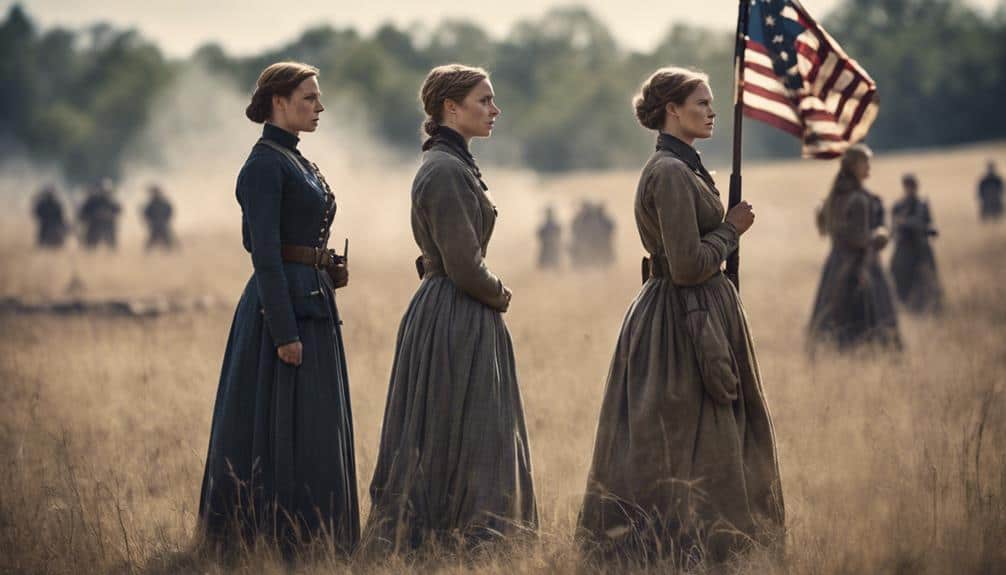
The remarkable bravery and contributions of women during the Civil War have left an indelible mark on history, challenging and redefining societal norms of their time. Women like Clara Barton and Harriet Tubman stepped into roles traditionally held by men, serving as nurses and spies. Their bravery and tenacity provided critical support to soldiers, and their efforts didn't go unnoticed.
Clara Barton's tireless work laid the groundwork for the American Red Cross, while Harriet Tubman's intelligence efforts saved countless lives. Louisa May Alcott, better known for her literary achievements, displayed immense courage by working as a nurse in a Union hospital. Her firsthand experiences with the horrors of war profoundly influenced her writing.
Mary Edwards Walker, a surgeon, went even further by breaking barriers in the medical field. Her bravery earned her the distinction of being the first woman to receive the Medal of Honor. These hidden heroes, through their courage and sacrifice, have left a legacy that resonates today. They paved the way for future generations of women to break barriers and contribute meaningfully to society.
Their actions serve as a tribute to the enduring strength and resilience of women.


